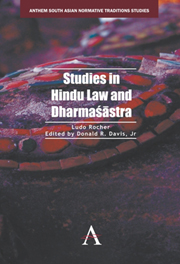Book contents
- Frontmatter
- Contents
- Foreword by Richard W. Lariviere
- Preface
- Abbreviations
- Note on the Edition
- Introduction
- PART ONE THE NATURE OF HINDU LAW
- PART TWO GENERAL TOPICS OF HINDU LAW
- PART THREE HINDU LEGAL PROCEDURE
- PART FOUR TECHNICAL STUDIES OF HINDU LAW
- Possession Held for Three Generations by Persons Related to the Owner
- The Vīramitrodaya on the Right of Private Defence
- The Technical Term Anubandha in Sanskrit Legal Literature
- The Kāmasūtra: Vātsyāyana's Attitude toward Dharma and Dharmaśāstra
- In Defense of Jīmūtavāhana
- Dāsadāsī
- The Definition of Vākparuṣya
- Janmasvatvavāda and Uparamasvatvavāda: The First Chapters on Inheritance in the Mitākṣarā and Dāyabhāga
- Karma and Rebirth in the Dharmaśāstras
- Notes on the Technical Term Sāhasa: “Fine, Pecuniary Penalty”
- Avyāvahārika Debts and Kautilya 3.1.1–11
- The Sūtras and Śāstras on the Eight Types of Marriage
- Caritraṃ Pustakaraṇe
- The Terms Niyukta, Aniyukta, and Niyoga in Sanskrit Legal Literature
- The Aurasa Son
- The Introduction of the Gautamadharmasūtra
- PART FIVE ANGLO-HINDU AND CUSTOMARY LAW
- Bibliography
- Index
The Technical Term Anubandha in Sanskrit Legal Literature
from PART FOUR - TECHNICAL STUDIES OF HINDU LAW
Published online by Cambridge University Press: 05 February 2013
- Frontmatter
- Contents
- Foreword by Richard W. Lariviere
- Preface
- Abbreviations
- Note on the Edition
- Introduction
- PART ONE THE NATURE OF HINDU LAW
- PART TWO GENERAL TOPICS OF HINDU LAW
- PART THREE HINDU LEGAL PROCEDURE
- PART FOUR TECHNICAL STUDIES OF HINDU LAW
- Possession Held for Three Generations by Persons Related to the Owner
- The Vīramitrodaya on the Right of Private Defence
- The Technical Term Anubandha in Sanskrit Legal Literature
- The Kāmasūtra: Vātsyāyana's Attitude toward Dharma and Dharmaśāstra
- In Defense of Jīmūtavāhana
- Dāsadāsī
- The Definition of Vākparuṣya
- Janmasvatvavāda and Uparamasvatvavāda: The First Chapters on Inheritance in the Mitākṣarā and Dāyabhāga
- Karma and Rebirth in the Dharmaśāstras
- Notes on the Technical Term Sāhasa: “Fine, Pecuniary Penalty”
- Avyāvahārika Debts and Kautilya 3.1.1–11
- The Sūtras and Śāstras on the Eight Types of Marriage
- Caritraṃ Pustakaraṇe
- The Terms Niyukta, Aniyukta, and Niyoga in Sanskrit Legal Literature
- The Aurasa Son
- The Introduction of the Gautamadharmasūtra
- PART FIVE ANGLO-HINDU AND CUSTOMARY LAW
- Bibliography
- Index
Summary
In his book Manu and Yājñavalkya (1930: 83–84), when treating the term anubandha in its technical sense, K.P. Jayaswal proposes the meaning: “cause, motive” of an offense. He draws this conclusion from two sources: a passage from the Mānava-Dharmaśāstra and one from a pillar edict of Aśoka.
Nevertheless, in our experience, not only does the learned author's opinion not agree with a great number of sources other than those used by him, but in the said sources themselves the recorded meaning is open to serious objections.
We are not sufficiently acquainted with the language of Aśoka's edicts so as to be inclined to draw conclusions from them. Yet, below we shall venture an interpretation which is different from Jayaswal's. Before that, however, we want to make a few annotations on the meaning of anubandha in the legal texts.
We shall not maintain that this short note fixes the meaning of anubandha definitively; for this purpose all the texts on vyavahāra would have to be exhausted. The only thing we want to do is to deliver a limited contribution to circumscribing the meaning of the term.
The text on which Jayaswal has founded the meaning of anubandha is MDh 8.126: when inflicting punishment the king shall take into consideration:
anubandha,
deśa = place,
kāla = time,
sāra = the power or ability of the wrongdoer,
aparādha = the offense.
- Type
- Chapter
- Information
- Studies in Hindu Law and Dharmasastra , pp. 473 - 480Publisher: Anthem PressPrint publication year: 2012



